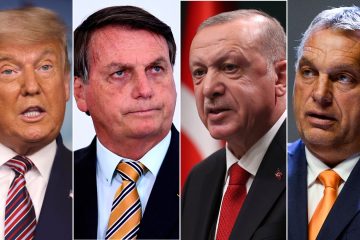
Identity Capital and the North-South Gap in Explaining Populism
The literature on populism in the 21st century often assumes that far-right leaders draw their support from voters who have lost out to globalisation. This is the case among low-skilled, white workers in Global North democracies, including the United States. But, there are also meaningful occurrences of backlash against the political establishment and liberal values in parts of the Global South that have clearly benefited from the post-Cold War trade openness. For instance, two of the largest democracies in the developing world have been shaken by right-wing movements that came to power with the support of the winners of economic liberalisation. In Brazil, Jair Bolsonaro, a former army captain, won the presidency in 2018 with the support of agribusiness exporters …

ISRAEL AND IRAN: WHAT NEXT?
With this month’s direct military strikes against each other, a war between Israel and Iran becomes not only conceivable but a growing risk. For all Israel’s advantages and determination, with the most sophisticated military in the region and an innovative and resilient economy, it is a small country of less than ten million people. Iran is a large country of over 80 million people whose economy and military capabilities have survived years of crippling sanctions. The outcome would depend on who had the strongest external support. For the time being, Israel has firm international friends and allies, as Iranian diplomats recognise. But that international support is under strain from the Israeli government’s refusal to consider any negotiations with the Palestinians …

OxPol Blogcast. Politics, Re-Imagined — Displacement and the World Economy with Alexander Betts
How can we ensure that displaced people live in safety and dignity and create a policy that is sustainable at the same time? In this episode, we speak to Dr. Alexander Betts, the Leopold Muller Professor of Forced Migration and International Affairs at the Refugee Studies Centre, and the Director of the Refugee Economies Programme, both at the University of Oxford. Alexander has written extensively on the political economy of refugee protection — highlighting how displaced people can access and contribute to economies worldwide. Politics, Re-Imagined is a series by the Department of Politics and International Relations (DPIR) at the University of Oxford focused on exploring tangible and sustainable solutions to the most pressing challenges facing humanity today. Listen on:
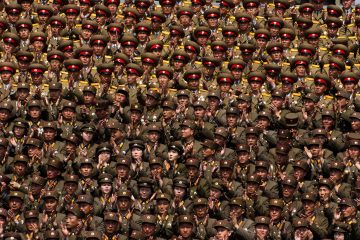
OxPol Blogcast. Nuclear Security with Edward Howell
What does security mean to different people, in different places, under different circumstances? And what do academics view as the most pressing security issues for the future? In this bonus episode, Eden Raviv speaks to Dr. Edward Howell, Lecturer in Politics at Christ Church at the University of Oxford, to try to understand the concept. Dr. Howell’s research focuses on the politics and international relations of North Korea, the Korean Peninsula and East Asia. Join them as they discuss his latest book, North Korea and the Global Nuclear Order: When Bad Behaviour Pays (2023) and talk about North Korea, nuclear proliferation and bridging the divide between academia and policy. Listen on:

Disease Knows No States: Towards an International ‘Biorelations’
Michel Foucault refers to biopolitics as “the processes by which human life, at the level of the population, emerged as a distinct political problem in Western societies”. Yet for Foucault, ‘biopower’ – power over human life at the population level – remains a force strictly wielded via individuals. This neglects the global biopower wielded by biology itself. Given the sheer influence of disease on global politics, we must move to considering ‘international biorelations’: a study that recognises diseases as significant non-state ‘actors’ shaping geopolitical landscapes and giving rise to critical, yet often neglected, transstate dynamics. Doing so would help us capture the co-constitution of global health forces and international structures, reveal the limitations of state-centric IR scholarship, and better understand …
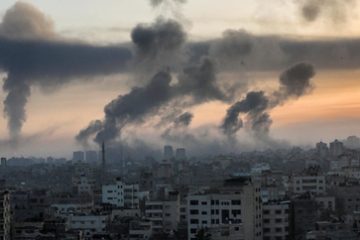
After Gaza: Prospects for a political solution to the conflict
Despite the appalling course of events since 7 October, the continuing fighting and the suffering of the bereaved and displaced in Israel and Gaza, people are beginning to ask where this will all end, how it will end, and even whether it will end? It is essential to address these questions now, because a lasting solution can only be found once people on both sides have some hope for the future The emergence of the two-state solution Since the 1917 Balfour Declaration declared support for a Jewish homeland in Palestine and fuelled the two growing national movements of Jews and the Palestinian Arabs, there have been only three possible solutions to the question of who lives in the land between …

Why the West Should Tread Cautiously when Using Asset Freezes
The war in Ukraine has been raging for almost two years now. In the early days of Russia’s full-scale invasion, Western countries imposed sweeping sanctions on the Russian economy, a significant part of which was made up of asset freezes on some $300 billion in assets owned by the Russian Central Bank and Russian oligarchs. The war has devastated much of Ukraine’s eastern regions, infrastructure, and cities. The West has pledged to help rebuild Ukraine once the war is over, but such a task will cost billions, if not trillions, of dollars to accomplish. One solution advanced by Western lawmakers is to seize the assets that were frozen by sanctions and donate them to Ukraine to finance its reconstruction once …
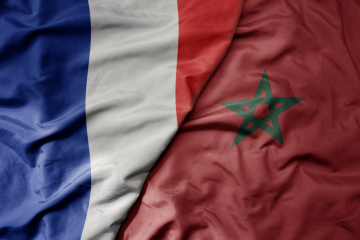
Have we underestimated migration in the Franco-Moroccan diplomatic crisis?
Traditionally close partners, Morocco and France have seen their relationship deteriorate in recent years under a variety of pressures. Much analysis has focused on the role of high politics and diplomatic considerations, such as the question of the sovereignty of Western Sahara. This article argues that while these are important, bottom-up approaches must also be considered. In particular, we highlight the impact of visa restrictions on inter-societal links, and how these affect the core of bilateral relations by damaging the human fabric of politics. The “exceptional partnership” between France and Morocco is a thing of the past, or at least severely damaged. Over the last two years, new crises have erupted at regular intervals. The most recent source of tension …
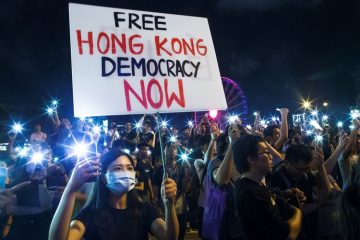
Can the Pro-Democracy Hong Kong Lobby Still Influence Western Foreign Policy?
During the 2019 Anti-Extradition Bill protests in Hong Kong, activists made extensive efforts to internationalize their movement, engaging in public diplomacy and lobbying foreign governments to support their cause. The Hong Kong pro-democracy lobby—a loose coalition of individuals and organizations aiming to steer Western foreign policy in a direction they believe will benefit Hong Kong’s democratic prospects—emerged amidst this unprecedented grassroots mobilization. Four years on, however, the Hong Kong lobby is facing an uncertain future. Activists are striving to overcome the barriers posed by transnational repression and reinvent their image in today’s fraught geopolitical landscape. Two factors explain the success of Hong Kong activists in constructing and consolidating their lobbying infrastructure in 2019. First, the expansion and transformation of the …







